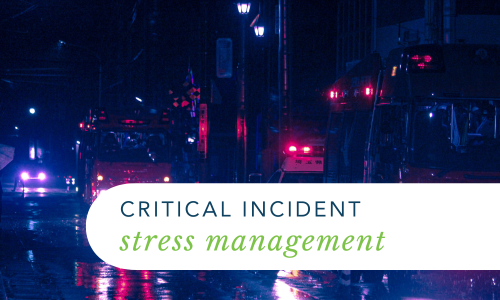Critical Incident Stress Management (CISM) and its Benefits
People and communities face a constant stream of challenging events that can deeply affect their mental health. Natural disasters, accidents, violence, and acts of terrorism are a few examples of critical incidents that can inflict distress and lasting emotional wounds. To tackle these difficulties, Critical Incident Stress Management (CISM) has emerged as a crucial framework to foster resilience and aid in the recovery process following these occurrences.
Understanding Critical Incident Stress Management:
CISM is a strategy aimed at offering support and aid to individuals and groups who have been impacted by a critical incident. CISM incorporates principles from crisis intervention, psychological first aid, and trauma-focused therapies. Its primary objective is to ease the immediate and long-term psychological consequences of critical incidents by encouraging healthy mechanisms, reducing stress, and supporting emotional recovery.
Components of Critical Incident Stress Management:
Preventing Crisis: CISM acknowledges the significance of taking proactive steps to foster resilience. It involves educating individuals and workplaces on how to prepare for critical incidents through training, simulations, and the creation of response plans. This preparation plays a crucial role in minimising the psychological impact of these events by instilling a sense of preparedness and equipping individuals with coping abilities.
Crisis Response Briefing (CRB): Following a significant incident, a CRB is organised to gather individuals affected by the event and deliver crucial information, address potential emotional responses, and provide immediate support. This group session looks to normalise reactions, address uncertainties, and enable early intervention to mitigate the onset of stress symptoms.
Individual Crisis Intervention (ICI): Acknowledging the emotional needs of individuals, CISM provides individual crisis intervention sessions. These sessions involve personal interactions between individuals and skilled professionals, creating a secure environment for expressing emotions, navigating through experiences, and receiving support in handling stress reactions. ICI sessions incorporate techniques, including active listening, and empathy, to assist individuals in restoring a sense of control and building resilience.
Critical Incident Stress Debriefing (CISD): CISD is a group intervention that takes place within 24-72 hours following a critical incident. Led by a skilled facilitator, this session provides an opportunity for individuals to openly express their experiences, thoughts, and emotions connected to the incident. By encouraging dialogue and offering support, CISD seeks to normalise reactions, ease distress, promote social support, and facilitate personal growth after experiencing trauma.
Benefits of Critical Incident Stress Management:
Timely Intervention: Through prompt assistance and guidance, CISM plays a crucial role in averting the emergence of enduring psychological challenges. Early intervention diminishes the chances of individuals facing chronic stress, post-traumatic stress disorder (PTSD), or any other mental health disorders.
Facilitates Post-Traumatic Growth: Critical incidents can be distressing, but they can also serve as facilitators for personal growth and positive change. CISM interventions encourage individuals to reframe their experiences, find meaning, and develop a sense of post-traumatic growth.
CISM is a vital framework that supports individuals and communities affected by critical incidents. It provides timely intervention, resilience promotion, and social support to empower individuals in overcoming trauma. CISM encompasses proactive measures like preparedness, briefings, interventions, and debriefings, offering comprehensive support to those impacted. By fostering resilience and facilitating healing, CISM contributes to the overall well-being and recovery of individuals and communities in crisis. Workplaces can further support this CISM process by having an effective Employee Assistance Program (EAP) in place.
Workplace Emergency Management is able to help with preparing your workforce for responding to emergencies and helping them to understanding what to expect when confronted with the various emergencies and critical incidents that may affect them. Is your workplace prepared?
You can visit our Emergency Training page for more information, or get in touch to arrange a consultation with our Workplace Consultants.
GET IN TOUCH
Are you ready for peace of mind that your workforce is as safe and prepared as possible?
With a dedicated team of staff ready to help you meet compliance requirements and improve the overall safety of your workplace, all you need to do is get in touch.
Request your free audit today!



